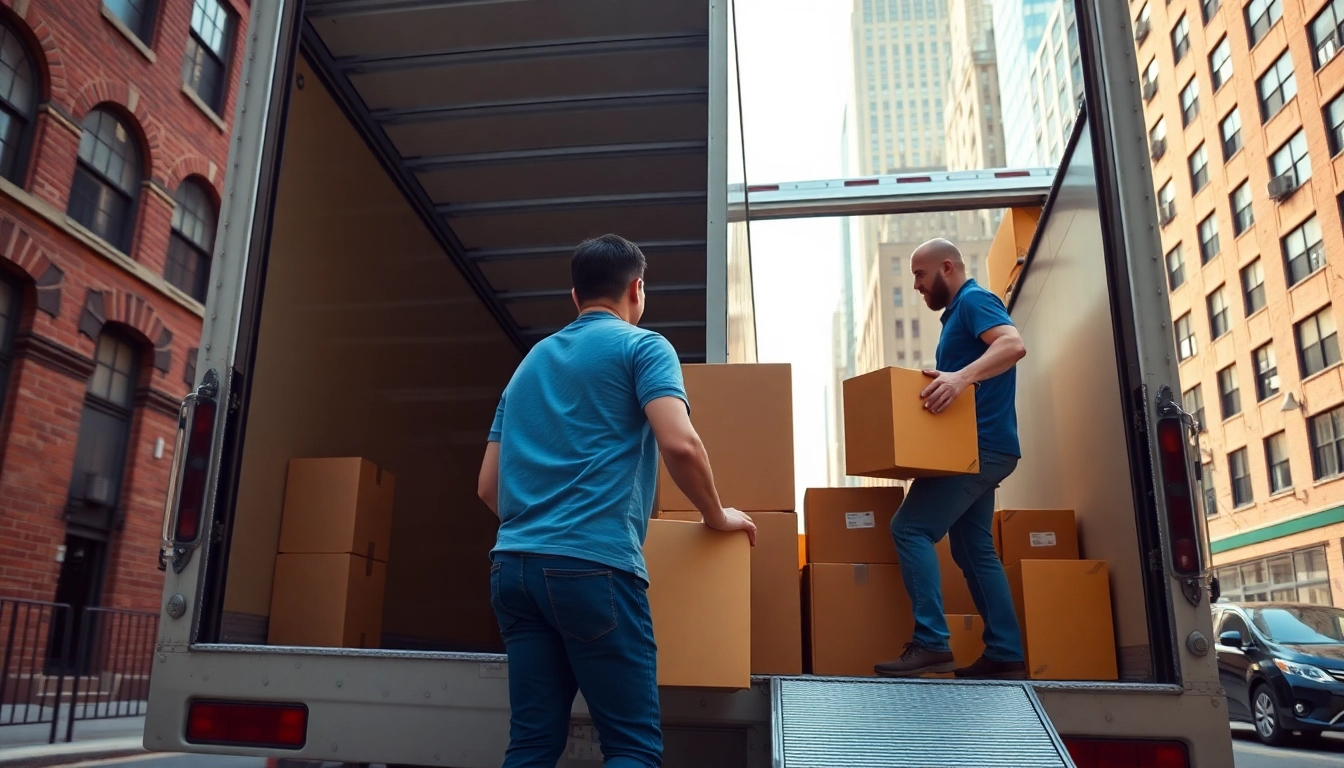Understanding the Movers NYC Market
1. Overview of Moving Services in NYC
Moving in New York City is a unique challenge due to the bustling environment, narrow streets, and high-density living. The demand for moving services in NYC has led to a diverse range of companies offering everything from basic moving assistance to full-service solutions that handle every aspect of a move. Options may include packing, transporting, and unpacking goods, which can be particularly beneficial for those who are busy with work or family commitments. The city’s movers often provide tailored services that meet the needs of different residents, whether they are moving across the street, to another borough, or out of state. For those seeking reliable movers NYC, there are many options, but navigating through the choices can be complex.
2. Key Players in the Moving Industry
The NYC moving industry is competitive, featuring well-established players and emerging companies. Notable mentions include:
- Piece of Cake Moving & Storage: Known for high customer satisfaction and flat-rate pricing, they are highly rated among locals.
- FlatRate Moving: A pioneer in the flat-rate model, focusing on providing transparent pricing and a high standard of service.
- Roadway Moving: Offers a stress-free experience with a team dedicated to customer care and satisfaction.
- Oz Moving & Storage: They combine experience with affordability, appealing to a broad audience.
- Shleppers: Recognized for their extensive network and professionalism across various move types.
3. Common Myths About Movers in NYC
A number of misconceptions about moving companies persist in NYC. Understanding these myths is essential to making informed decisions:
- Myth: All movers are expensive: While some premium services do come at a higher price, many companies offer competitive rates and budget-friendly options.
- Myth: You only need to hire movers for long-distance moves: Many local residents find hiring a moving company beneficial, even for short-distance relocations.
- Myth: Movers will break all your belongings: Professional movers use training and best practices to minimize damage, and most reputable companies are insured to cover mishaps.
Factors to Consider When Choosing Movers NYC
1. Pricing Models: Hourly vs. Flat Rates
When selecting movers, understanding pricing models is crucial. Movers typically charge either by the hour or a flat rate:
- Hourly rates: This method can be more economical for smaller jobs or last-minute moves. However, it’s essential to consider the estimated time frame, as delays can increase costs.
- Flat rates: This pricing structure provides transparency. It includes all costs associated with the move, which can help in budgeting accurately. Flat rates are ideal for larger moves or when moving complex items.
Assess your specific requirements to choose the model that suits you best. It’s often beneficial to request quotes from various companies and compare how they break down prices.
2. Customer Reviews and Recommendations
Word of mouth and online reviews are valuable resources when selecting a mover. Checking platforms such as Yelp, Google Reviews, and specialized moving review sites can provide insights into the experiences of other customers. Look for trends in reviews regarding:
- Reliability and punctuality
- Customer service quality
- Attention to detail during packing and loading
- Damage claims processes
Recommendations from friends or family who have moved recently are also crucial. Personal experiences can give perspectives on local movers that online reviews may not capture.
3. Licensing and Insurance Requirements
Before hiring a moving company, it’s vital to ensure they comply with local and state regulations:
- Licensing: Check if the company is registered with the Department of Transportation (DOT). Companies that operate across state lines must have a federal DOT number.
- Insurance: A reputable moving company should carry liability insurance. This not only protects them but also provides coverage for your belongings during transit. Understanding the details of their insurance policy can save you from potential heartbreak later.
Always request proof of both licensing and insurance before committing to any moving company.
Best Practices for Packing and Preparation
1. Essential Packing Tips for a Smooth Move
Effective packing can significantly ease the stress of moving. Consider these best practices:
- Start Early: Give yourself plenty of time to pack up your belongings. Starting a few weeks in advance can help prevent last-minute chaos.
- Declutter: Before you begin packing, evaluate your items. Donate or sell anything you no longer need. This reduces the volume of items to move and can make your new space feel less cluttered.
- Use Quality Packing Materials: Invest in sturdy boxes, packing tape, and protective materials like bubble wrap or foam peanuts. Quality materials can protect your items better during the move.
- Label Boxes Clearly: Mark each box with its contents and which room it is meant for in your new home. This will make unpacking more straightforward and faster.
2. Managing Inventory: What to Keep or Discard
Deciding what to keep during a move can be daunting. Here’s a helpful approach:
- Create a list of all items you possess.
- Use the one-year rule: If you haven’t used an item in the past year, consider whether you truly need it.
- Evaluate the condition of each item. If something is broken or worn out, it’s likely time to dispose of it.
- For items of sentimental value, consider taking photographs. This can allow you to keep memories without the physical items.
By carefully assessing your belongings, you can streamline your move and make your new home less cluttered from the start.
3. Timing Your Move: When Is the Best Time?
The timing of your move can greatly influence the cost and complexity. Consider these factors when planning:
- Seasonality: Summer is peak moving season in NYC. If you can move during the off-peak seasons of fall or winter, you may find better availability and lower prices.
- Weekdays vs. Weekends: Weekends can be crowded, as everyone is off work. If possible, choose a weekday to move, as there may be less traffic and moving companies are often less busy.
- End of Month: Monthly leases often end at the end of the month, making it a notoriously busy time for movers. If you can, avoid this time frame for a smoother moving experience.
Understanding Moving Contracts and Policies
1. Key Elements of a Moving Contract
Before finalizing your arrangements, carefully review the moving contract to understand the details. Important elements include:
- Services Included: Ensure the contract outlines precisely what services the moving company will provide—packing, loading, transporting, and unpacking.
- Fee Structure: Look for detailed price structures, including extra fees for special services such as heavy lifting or using an elevator.
- Cancellation Policies: Understand the terms regarding cancellations or changes to your move date, including any fees that may apply.
2. Knowing Your Rights as a Customer
It’s vital to know your rights as a consumer when entering into a contract with a moving company. These rights include:
- Right to Written Estimates: The company must provide a written estimate if requested.
- Right to a Bill of Lading: This document outlines the contract and specifics of your move. You should receive this document at the beginning of the service.
- Right to File a Claim: If your belongings are damaged or lost, you have the right to file a claim for compensation, depending on the policy of the company.
3. Handling Claims and Disputes with Movers
In the unfortunate event that your belongings are damaged or lost, knowing how to handle a claim is essential:
- Document Everything: Take photos of damaged items and keep receipts for any items that need replacement.
- Contact the Company: Report the issue to the moving company as soon as possible. Follow their claim process.
- Remain Professional: When discussing the situation with the company, maintain professionalism to foster resolution and avoid escalation.
If disputes cannot be resolved directly, consider seeking mediation. Many states and localities have consumer protection lawyers who can assist.
Post-Move Considerations and Settling In
1. Unpacking Strategies for Efficiency
After the big move, it’s time to unpack. Effective unpacking strategies can help you settle in more quickly:
- Unpack by Priority: Begin with items you need immediately—such as kitchen essentials, bathroom necessities, and bedroom basics. Save less critical items for later.
- Set Up Each Room: Focus on one room at a time. This method prevents feeling overwhelmed and helps create a sense of progress.
- Recycling and Disposal: Have a plan for the boxes and packing materials. Recycling keeps your new place tidy and alleviates clutter.
2. Tips for Adapting to Your New Neighborhood
Moving presents an opportunity to explore and integrate into a new community. Consider these suggestions to get acclimated:
- Explore Local Amenities: Familiarize yourself with nearby grocery stores, restaurants, parks, and other essential services.
- Meet Your Neighbors: Take time to introduce yourself and nurture relationships with neighbors, which will enhance your sense of belonging.
- Community Events: Engage with local events, festivals, or community activities to connect with others and experience the culture of your new neighborhood.
3. Resources for New NYC Residents
As a new NYC resident, access a variety of resources to ease your transition:
- City Guides: Utilize online city guides or apps that provide info on public transportation, local services, and attractions.
- Community Boards: Check local online forums or community boards for recommendations and advice specific to your neighborhood.
- Neighborhood Associations: Joining local clubs or associations can help you build connections and access useful resources.















Leave a Reply